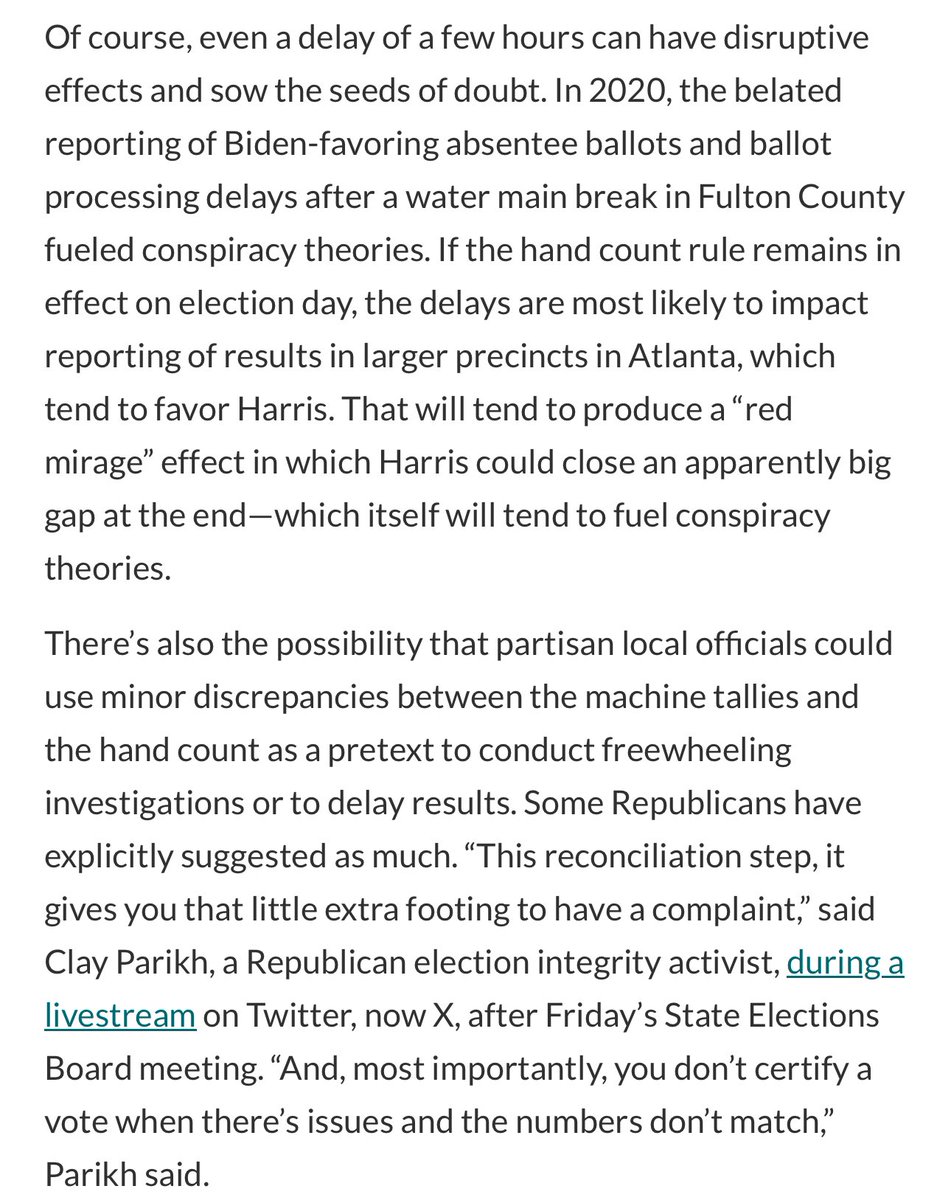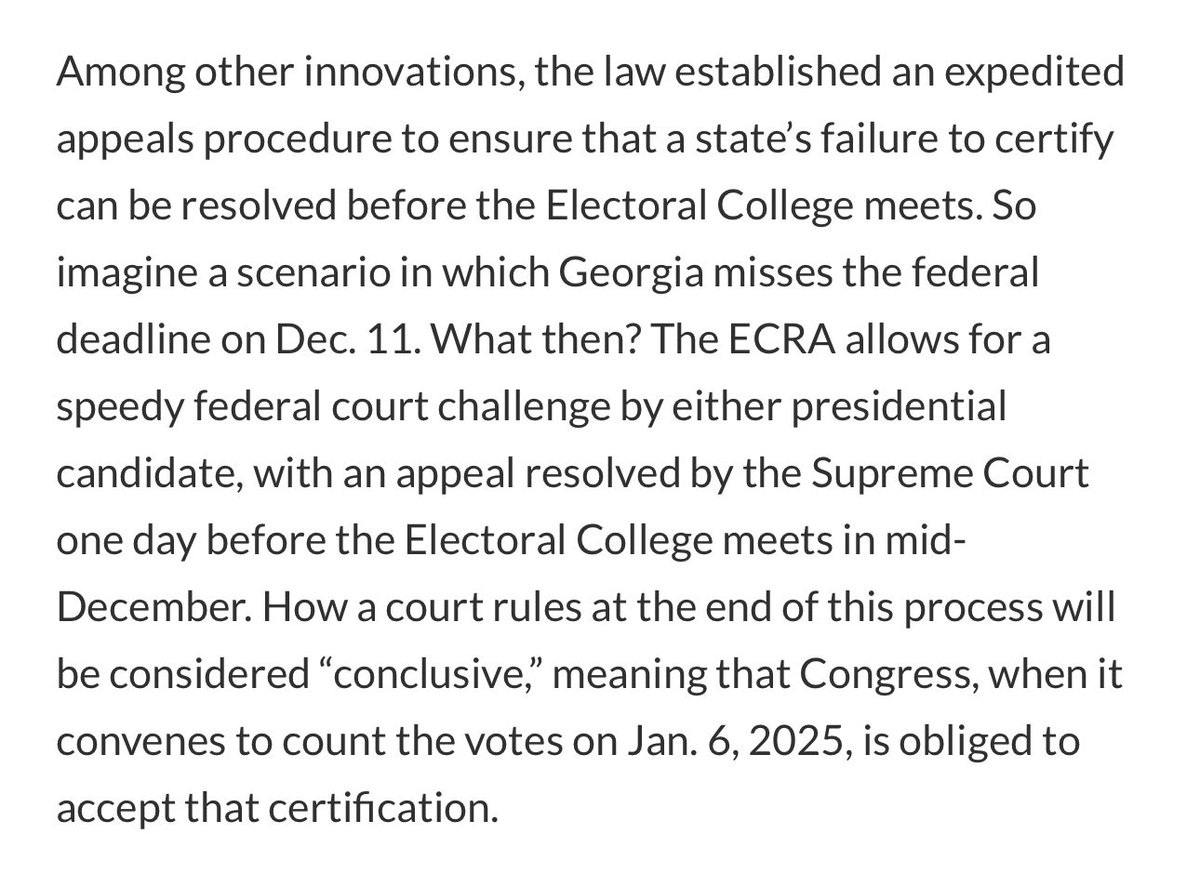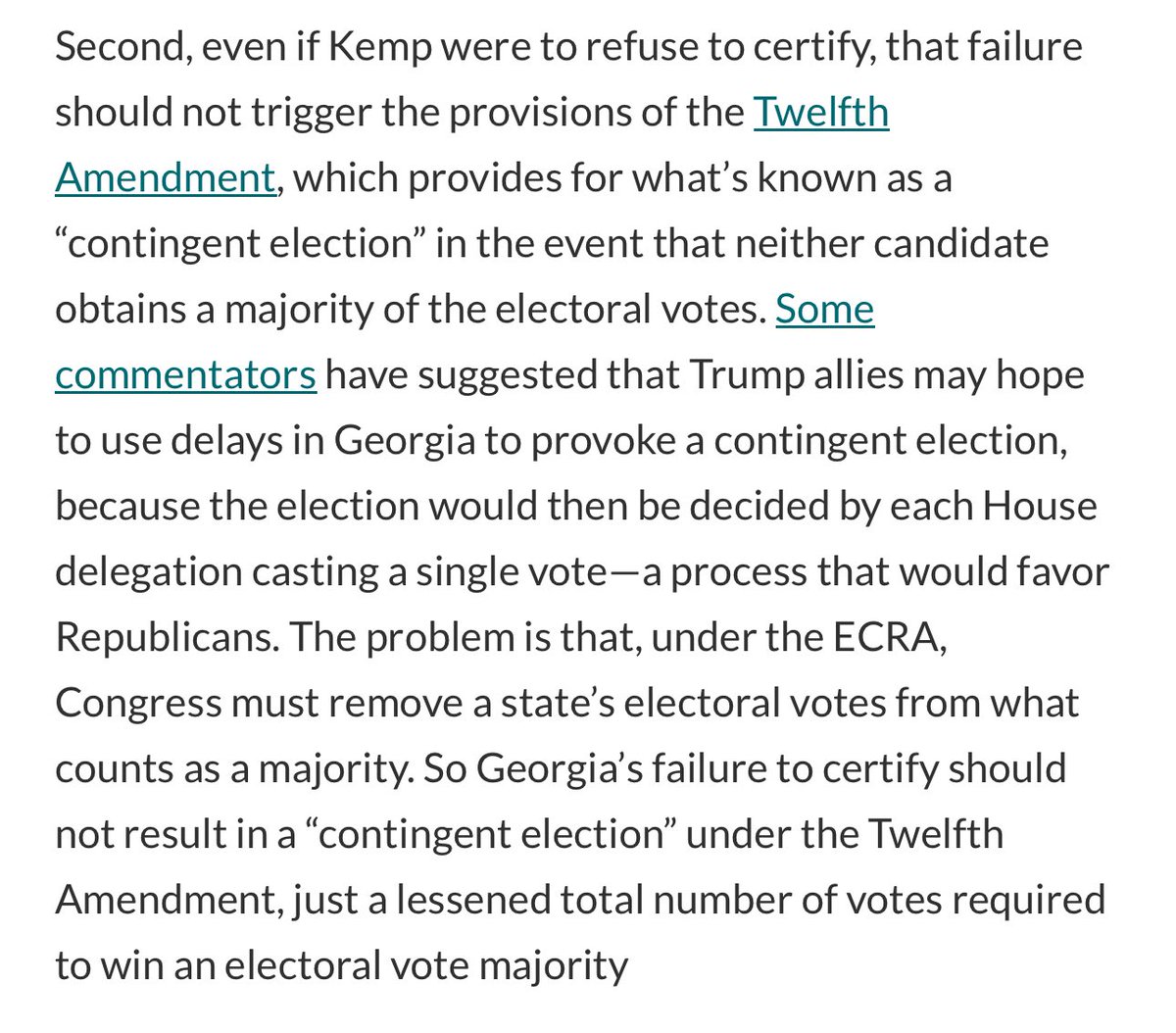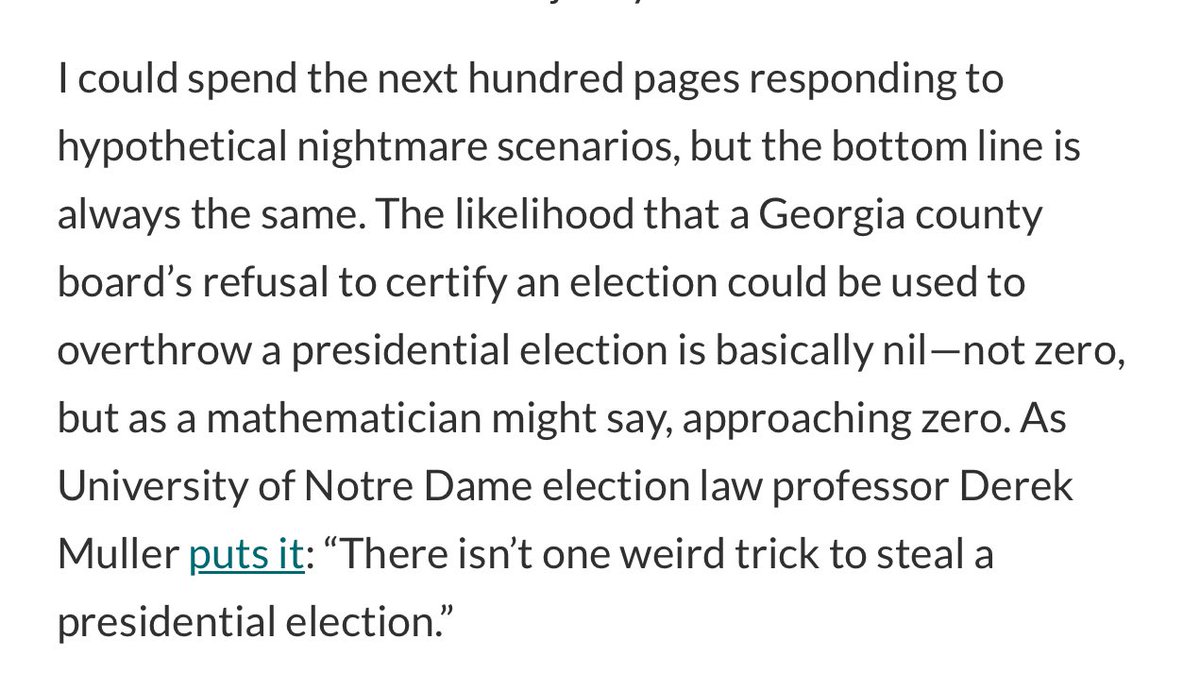NEW: The new election rules in Georgia will almost certainly *not* hamstring the certification of the state’s electoral votes. And even if certification is delayed, such delays do not open up a legal loophole for Trump to steal the presidency. I explain ⬇️
lawfaremedia.org/article/will-g…
lawfaremedia.org/article/will-g…
A new Trump-friendly majority of Georgia’s State Election Board sparked controversy when it approved rule changes that commentators say could delay or outright obstruct certification of Georgia’s election results.
2/
lawfaremedia.org/article/will-g…

2/
lawfaremedia.org/article/will-g…

The changes prompted concerns that Trumpworld could use certification delays in another attempt to reject an unfavorable presidential election outcome.
The nightmare scenarios would be quite alarming—if there was any real chance that things could play out that way.
3/
The nightmare scenarios would be quite alarming—if there was any real chance that things could play out that way.
3/

The mischief being perpetrated by the board is certainly pernicious and may very well fuel post-election lawlessness and disinformation by partisan election officials.
But the more alarmed commentators are overstating the legal and practical import of the rules. 4/
But the more alarmed commentators are overstating the legal and practical import of the rules. 4/

Take, for example, the rule that requires county boards to conduct a “reasonable inquiry” before certifying an election. Critics say the rule would empower officials to delay or refuse to certify election results if it thinks it needs to investigate. 5/
lawfaremedia.org/article/will-g…

lawfaremedia.org/article/will-g…

That line of thought apparently provoked many media outlets to make inaccurate proclamations about the legal effect of the rule.
The rule has been described as though it transformed certification into a discretionary process, empowering local boards to withhold results. 6/
The rule has been described as though it transformed certification into a discretionary process, empowering local boards to withhold results. 6/

And, to be sure, those reports have been informed by what proponents of the rule might be *trying* to accomplish.
The petitioner who proposed the rule even said as much during his testimony before the State Elections Board. 7/
lawfaremedia.org/article/will-g…

The petitioner who proposed the rule even said as much during his testimony before the State Elections Board. 7/
lawfaremedia.org/article/will-g…

But what someone wants a rule to do is distinct from what it actually does.
Here, the “reasonable inquiry” rule does not—indeed, cannot—give local officials the power to delay certification beyond the statutory deadline set out in GA state code.
8/lawfaremedia.org/article/will-g…
Here, the “reasonable inquiry” rule does not—indeed, cannot—give local officials the power to delay certification beyond the statutory deadline set out in GA state code.
8/lawfaremedia.org/article/will-g…
Why?
Because the State Election Board—an administrative body—can only adopt rules insofar as those rules are authorized by and consistent w/ state statutory law.
And Georgia law sets out a crystal-clear, mandatory deadline for certification. The SEB can’t override that. 9/
Because the State Election Board—an administrative body—can only adopt rules insofar as those rules are authorized by and consistent w/ state statutory law.
And Georgia law sets out a crystal-clear, mandatory deadline for certification. The SEB can’t override that. 9/

All of which is why it is not actually difficult to predict how a court would interpret the “reasonable inquiry” rule. It’s really not a close call, and I suspect Judge Robert McBurney will say as much if and when he weighs in on the matter ahead of the election.
10/
10/

Ok, you might be thinking, but what about that other rule, the one that would require poll workers in each precinct in Georgia to count the number of ballots by hand?
Won’t that take weeks or possibly months??
Could THAT delay certification of the election in Georgia???
11/
Won’t that take weeks or possibly months??
Could THAT delay certification of the election in Georgia???
11/
You’d be forgiven for thinking as much, because initial media stories around the “hand count” rule suggested that it could delay the reporting of election results by weeks or months. (I cite the Post, but it wasn’t just the Post saying this!)
That estimate is wrong. 12/
That estimate is wrong. 12/

The confusion around the hand count rule seems to stem from a misunderstanding of the distinction between counting *ballots* and counting *votes.* The rule does not require a hand tally of votes, which would involve determining voter intent for dozens of races on each ballot. 13/ 

Instead, the rule requires a hand count of the *sheets of paper* that are stored in the scanner at the end of Election Day. Votes will be tallied by machine.
The hand count could cause some reporting delays. But delays, if any, are more likely to be a few hours at most. 14/
The hand count could cause some reporting delays. But delays, if any, are more likely to be a few hours at most. 14/

Of course, even relatively short delays in election result reporting can sow the seeds of doubt. And it’s possible that local officials could use minor discrepancies between the machine tallies and the hand count as pretext to delay certification. Not good. 15/ 

But (1) Efforts to delay or refuse certification based on minor errors or discrepancies discovered during the reconciliation process would be unlawful, and (2) there is a good chance that the hand count rule actually won’t be in effect at all when the election happens.
16/
16/

Now, I know what you’re thinking. All of this assumes that local officials will actually follow the law.
What happens if they ignore the language in the statute and, pointing to the SEB rules for legal cover, delay or refuse to certify anyway??
17/ lawfaremedia.org/article/will-g…
What happens if they ignore the language in the statute and, pointing to the SEB rules for legal cover, delay or refuse to certify anyway??
17/ lawfaremedia.org/article/will-g…
Here’s the doomsday scenario: Harris wins Georgia by a razor-thin margin. Local officials in some deep-red counties refuse to certify. As a result, Georgia fails to certify its slate of presidential electors by Dec. 11, the federal deadline. What then?
18/


18/


Well, first, understand that it’s exceedingly unlikely that we’ll even get to the “doomsday scenario” in the first place.
Why? Because there are judicial mechanisms in place to ensure that crucial deadlines can be met even if local officials drag their feet. 19/
Why? Because there are judicial mechanisms in place to ensure that crucial deadlines can be met even if local officials drag their feet. 19/

If a board refuses to certify its results, the Secretary of State—or another litigant with standing—can sue to force the board to comply with the law. During a briefing last week, @GabrielSterling said that the Secretary’s office has already game-planned for that scenario. 20/ 

Yeah, yeah, yeah, courts are slow. But timing shouldn’t be an issue. The relief a litigant would seek to force a county to certify is a “writ of mandamus.” It’s designed to move at judicial warp-speed. There should be plenty of time to resolve certification disputes by Dec. 11. 

But even if certification disputes cause Georgia to blow past the Dec. 11 federal deadline, legislative reforms enacted in the wake of the 2020 election provide for a process to ensure that a single, lawful slate of electors will be counted by Congress on Jan. 6, 2025.
22/
22/

The Electoral Count Reform Act established an expedited procedure to ensure that a state’s failure to certify can be resolved before the Electoral College meets. So if GA fails to certify, Harris could file suit in federal court, with any appeals likely resolved by Dec. 17.
23/
23/

It’s possible that Trump’s allies in Congress could use certification delays as pretext to raise an objection to Georgia’s electoral slate, but the ECRA mitigates those concerns. Rejecting a state’s electoral votes requires a majority of both the House and the Senate. 24/ 

But what if, at the end of the expedited appeals process, Georgia STILL refuses to certify? Would the election be thrown to the House of Representatives under the Twelfth Amendment?
There are political and legal realities that answer or mitigate those concerns, too.
25/
There are political and legal realities that answer or mitigate those concerns, too.
25/
For one thing, the guy in charge of certifying Georgia’s electoral slate is Governor Brian Kemp. If a federal court determines that he should certify Georgia’s electors for Harris, he’s not going to defy that order. It’s just not going to happen. 26/ 

If Kemp were to refuse to certify, that should not trigger the 12th Amendment. Under the ECRA, Congress must remove a state’s electoral votes from what counts as a majority. So a failure to certify would just result in a lessened total # of votes required to win a majority. 27/ 

I could spend hours responding to the inevitable BUT WHAT IF’s waiting in my replies.
The bottom line is this: The likelihood that a Georgia county board’s refusal to certify could be used to overthrow a presidential election is basically nil—not zero, but approaching zero.
The bottom line is this: The likelihood that a Georgia county board’s refusal to certify could be used to overthrow a presidential election is basically nil—not zero, but approaching zero.

• • •
Missing some Tweet in this thread? You can try to
force a refresh













